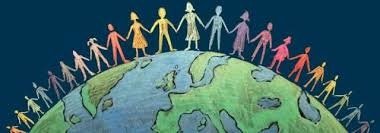是時候為“全球化”正名了(下)

Yet here we are, with globalisation commencing some sort of a retreat and with the panoply of western institutions built during the past 70 years to keep the peace and facilitate openness — the World Trade Organisation, the EU, Nato, the UN in all its forms — under attack. When times feel hard, blaming foreigners, those rapacious powers of globalisation, is naturally tempting. Where this will lead, we cannot know. But to make it likelier to lead to better times rather than worse ones, it is as well to diagnose our ailments properly.
但現在我們的處境是,全球化開始出現某種倒退,過去70年間為維持和平、促進開放而建立的大量西方機構——世界貿易組織(WTO)、歐盟(EU)、北約(Nato)、各種聯合國(UN)機構——正在受到攻擊。當時局艱難時,指責外國人(全球化的貪婪力量)自然成為誘人選項。局勢會如何發展,我們不得而知。但如果想讓局勢可能往好的方向發展,最好對我們的問題做出恰當的診斷。
That is why, in good Orwellian manner, the short word is preferable to the long one. But it mustn’t be left on its own. For although throughout the history of economic and social development openness has been a necessary virtue, it has not been a sufficient one. In practice, it has needed some contemporary interpretation of another word alongside it: equality.
這就是(按奧威爾的方式)短詞“開放”優於長詞“全球化”的原因。但僅靠開放肯定不行。因為,雖然在整個經濟和社會發展史上,開放是一個必要條件,它並非充分條件。實際上,“開放”需要當代意義上的“平等”一詞與它並肩作戰。
The virtue of openness is that it brings change in the form of better ideas, better ways of doing things, better sources of this good or that service. As the science writer (and now Conservative member of the House of Lords) Matt Ridley memorably put it in his 2010 book The Rational Optimist, progress and prosperity arrive “when ideas have sex”. In an age obsessed by Uber, this is known as “disruption”, but there is nothing new about it at all.
開放的優點是,它可以帶來各種變化:更優秀的思想、更佳的做事方式、更好的商品或服務。科普作家(現為上議院保守黨成員)馬特?里德利(Matt Ridley)在自己2010年的著作《理性樂觀派》(The Rational Optimist)中寫道,“當不同的思想'交配'時”,就會出現進步和繁榮。在一個被優步(Uber)困擾的時代,這被稱為“顛覆”,但這根本不是什麼新鮮事。
The trouble with change is indeed that it brings disruption, from which some people feel like winners and others feel like losers. For that reason, the societies that have absorbed and even embraced change most successfully have been those that gave a wide group of citizens some sort of a voice about what was going on, and about what collective efforts might be needed to deal with its consequences.
改變的問題其實就是它帶來了顛覆,有些人在其中感覺成了贏家,其他一些人感覺成了輸家。因此,最成功地吸收甚至擁抱變革的社會,是那些讓廣大市民對如下問題擁有一定發言權的社會:正在發生什麼事情以及需要共同採取何種努力來應對其後果。
We now call this democracy, as the equality of political rights has been extended to entire adult populations, but the same principle applied beforehand. Open societies such as 18th-century Britain and the Netherlands, which had relatively fluid elites and which traded ideas widely, prospered more than did closed ones. The secret to evolutionary success over the longer term has been the balancing of that openness with forms of equality that help to build social trust and provide reassurance.
如今,隨著平等的政治權利擴展到所有成年人,我們稱這為民主,但同樣的原則早已在社會中應用。開放社會——如18世紀擁有相對自由流動的精英且思想得到廣泛交流的英國和荷蘭——從前就比封閉社會更加繁榮。從長期來看,演進式成功的秘訣在於,在開放與各種形式的平等之間實現平衡,平等有助於建立社會信任、安穩民心。
So why has this gone wrong? The first answer is that it frequently goes wrong. The real question is whether stumbling societies can get on their feet again; whether they retain the power to evolve while rebuilding social trust. In 1975 the Trilateral Commission, a private body dedicated to dialogue between America, western Europe and Japan, published a report entitled “The Crisis of Democracy”. That report quoted Willy Brandt as having said, just before he stepped down as West Germany’s chancellor in 1974 that: “Western Europe has only 20 or 30 more years of democracy left in it; after that it will slide, engineless and rudderless, under the surrounding sea of dictatorship, and whether the dictation comes from a politburo or junta will not make that much difference.”
那麼,為什麼出了問題?第一種回答是,出問題是很常見的。真正的問題是,跌倒的社會是否還能站起來;它們能否還保持著一邊重建社會信任、一邊演進的能力。 1975年,致力於在美國、西歐、日本之間推動對話的民間組織——三邊委員會(Trilateral Commission)發布了一份名為《民主的危機》(The Crisis of Democracy)的報告。報告援引維利‧勃蘭特(Willy Brandt)在1974年辭去西德總理前不久說的話:“西歐民主只剩二三十年的時間;在那之後,他將衰落,失去動力,失去方向,陷入獨裁統治汪洋大海的包圍,無論是共產黨政治局的獨裁統治、還是軍政府的獨裁統治,都不會有太大區別。
Not a great prediction, given that in the same period Greece, Portugal and Spain all replaced dictators with democracies, but Brandt’s mind was no doubt swayed by the terrorism and disorder being felt in several European countries, by the discovery of an East German spy in his own office, and the economic troubles all western countries were then mired in thanks to the 1973 oil shock.
這預言不是太準確,因為在同一時期,希臘、葡萄牙和西班牙都以民主取代了獨裁者,但多個歐洲國家出現的恐怖主義和無序、勃蘭特自己的辦公室裡發現一名東德間諜以及1973年的石油危機後所有西方國家都陷入經濟危機,無疑堅定了他的想法。
The second answer, however, is that we’ve messed things up, again. We did so most spectacularly, and potentially fatefully, with the 2008 financial crisis, which we call global but was really American and European. That crisis reflected serious policy errors, of course, but also the excessive, because unequal, political power wielded by the financial industry. That is almost a decade ago now, but the effects live on, in household incomes that are no higher, and often lower, than in 2007. And, crucially, it lives on in the sense that the unequal grip of bankers and other oligarchs has been left largely unchanged.
然而,第二種回答是我們再次把事情搞砸了。我們以一種極為引人注目的方式(或許是注定的)把事情搞砸了——2008年的金融危機,我們稱之為全球金融危機,但實際上是美國和歐洲的危機。當然,此次危機反映了嚴重的政策錯誤,但也反映了金融業掌握的不平等的政治權力。那場危機距今已過去近10年,但影響依然還在,反映在家庭收入如今還沒有超過(通常低於)2007年的水平。關鍵是,這種影響還反映在人們的這種感覺中:銀行家和其他寡頭享有的不平等的支配力基本上毫髮無損。
Plenty of today’s ailments can be traced back to long before 2008, as technology disrupted labour markets, say, and demography raised the burdens on public finances of healthcare and pensions. But what 2008 did was to shake people’s faith in the whole system. It weakened or in some cases destroyed their belief that evolutionary solutions would eventually be found.
當今的很多問題都可以追溯到至2008年之前很久,比如,隨著技術顛覆勞動力市場,人口結構加重了醫療和養老金方面的公共財政負擔。但2008年金融危機動搖了人們對整個體制的信心。它削弱或(在某些情況下)摧毀了他們的信念,即最終會找到演進的解決方案。
The sense of equality has been badly damaged, not just in terms of incomes but of political voice. Openness to fully free flows of capital has been shown to be not just dangerous to economies but also liable to corrupt democracies. Social trust has been eroded.
平等的感覺已遭嚴重破壞——不僅在收入方面,而且在政治發言權方面。對資本完全自由流動的開放已被證明不僅威脅經濟體,而且容易腐蝕民主國家。社會信任已被侵蝕。
What Trump has done, as Lenin did a century ago, has been to sense the political winds and to sail into power thanks to their strength. Populists such as him and Le Pen get many things right: they should not be ignored. It is their solutions that are dangerous, because they are liable to close societies, to lead to fewer ideas having sex, and to damage the vital ability of democracies to evolve.
像一個世紀前列寧做得那樣,特朗普一直在感知政治風向,並利用其力量進入權力中樞。特朗普、勒龐這樣的民粹主義者在很多事情上是對的:他們不應被忽視。危險的是他們提出的解決方案,因為這些方案有可能導致社會封閉,導致更少的思想“交配”,破壞民主演進的重要能力。
Now, it is up to all those democracies to show that, like Brandt 40 years ago, the declinists are wrong. To do so, they will need to restore the harmony between openness and equality. It can be done. The question is whether it will be done.
如今,所有這些民主國家都肩負著如下責任:向世人證明,像40年前的勃蘭特那樣,衰落論者是錯誤的。要做到這一點,它們需要讓開放與平等重新和諧共處。這是可以做到的。問題在於是否有人做。
Bill Emmott will be speaking at the FT Weekend Oxford Literary Festival on Saturday April 1 about ‘The Fate of the West’, published by Economist Books in April (UK) and May (US)
比爾‧艾默特(Bill Emmott)的新書《西方的命運》(The Fate of the West)將由Economist Books於今年4月在英國出版,5月在美國出版。

![]() 重點單字
重點單字
(來源:本文來自可可英語)


 留言列表
留言列表

